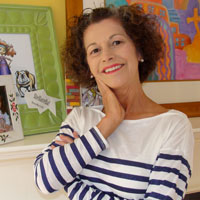Subjugation of Women Under a Male-Dominant Faith

Deborah (Debo) W. Dykes
We say little girls are precious. But the truth is, women are treated as second-class citizens, oppressed and overlooked by a world of male dominance. Even today, in the 21st century, women make up for two-thirds of the hungry and impoverished in the world. So, if little girls are so precious, why are they treated as if they are not? I grew up in a culture hemmed in by patriarchal traditions and an oppressive religious culture where God is male and women are to “be submissive to their husbands.” As an adult, I became aware that in the major traditions, Judaism, Islam, and Christianity, if a child attends a worship service, a class, sings a hymn, hears a creed, recites sacred text, that by the time they are 3 years old, it’s already too late – they will have to unlearn that God is male.I write a children’s book series called Stellarella. As I write, I am struck by several questions: Why wound our little girls with language that subjugates them under a male-dominant faith? Why not teach our children about a gender-inclusive God? Why should a little girl ever have to experience being less human, less significant, than a little boy simply because “she” is not created in the image of God?
Make no mistake – in a world where God is male, male children are groomed to believe that they are better fitted to deal with important issues and to make ultimate decisions about life – all of life – because they are created in the image of God and little girls are not!
I now believe, that after thousands of years of male domination and the use of exclusive male pronouns in religious language, it is little surprise that the political system in the United States can succeed in a brutal crackdown on women’s health and reproductive freedoms, women’s economic status, and the disenfranchisement of women’s right to vote. What world might there be for my granddaughters if God language was inclusive? What world might we be living in if, for our granddaughters, God were, for a time, referred to as She. “She” as a way of swinging the pendulum far to the opposite side in order to bring into awareness the oppressing and destructive “male” God language to half of all of humanity.
On January 15, 2014, one day before my publisher’s deadline for the final layout for Stellarella! Seashells on the Seashore!, my second book, to be released June 1, 2014, A Woman’s Nation “released its third in a series of Shriver Reports, A Woman’s Nation Pushes Back from the Brink, in partnership with the Center for American Progress.” ___http://shriverreport.org/about/
Maria Shriver, daughter of Eunice Kennedy Shriver, has led the way in providing this “groundbreaking investigation into the millions of women who are doing it all and barely scraping by, struggling to provide and parent in a nation that hasn’t kept pace with the modern realities of their lives.” ___http://shriverreport.org/about/
The Shriver Report is comprehensive and reveals staggering statistics regarding women struggling to make it – paycheck to paycheck. It is also significant in that it affirms the need to encourage little girls, women, grandmothers, mothers, and daughters to take action against a patriarchal system that dominates and oppresses women.
Joan Chittister, OSB, writes in the Shriver Report, “But even as far as we’ve come, women are still one class of people who are set apart, separated, and given less value and worth by multiple religious traditions. Religion has defined women by their maternity—just one dimension of a woman’s multifaceted humanity. Religion has defined women as “helpmates,” as too irrational to lead, too intellectually limited for the public dimensions of life. Though they are endowed with the same degree of sense, reason, and intellect as men, women have been locked out of full humanity and full participation in religious institutions and society at large. This marginalization of women masquerades as “protecting” them and even “exalting” them. Instead, these attitudes serve to deny the human race the fullness of female gifts and a female perspective on life.”
I write a children’s book series about a feisty-frizzy headed little girl, with an indomitable spirit and sassy style that introduces young, inquisitive children to a cast of autonomous, ethically diverse female characters who inspire and encourage. Stellarella is a little girl in whom every little girl can see herself – a little girl who will one day be a woman and a key contributor to the formation of policies and practices that form our global communities.
